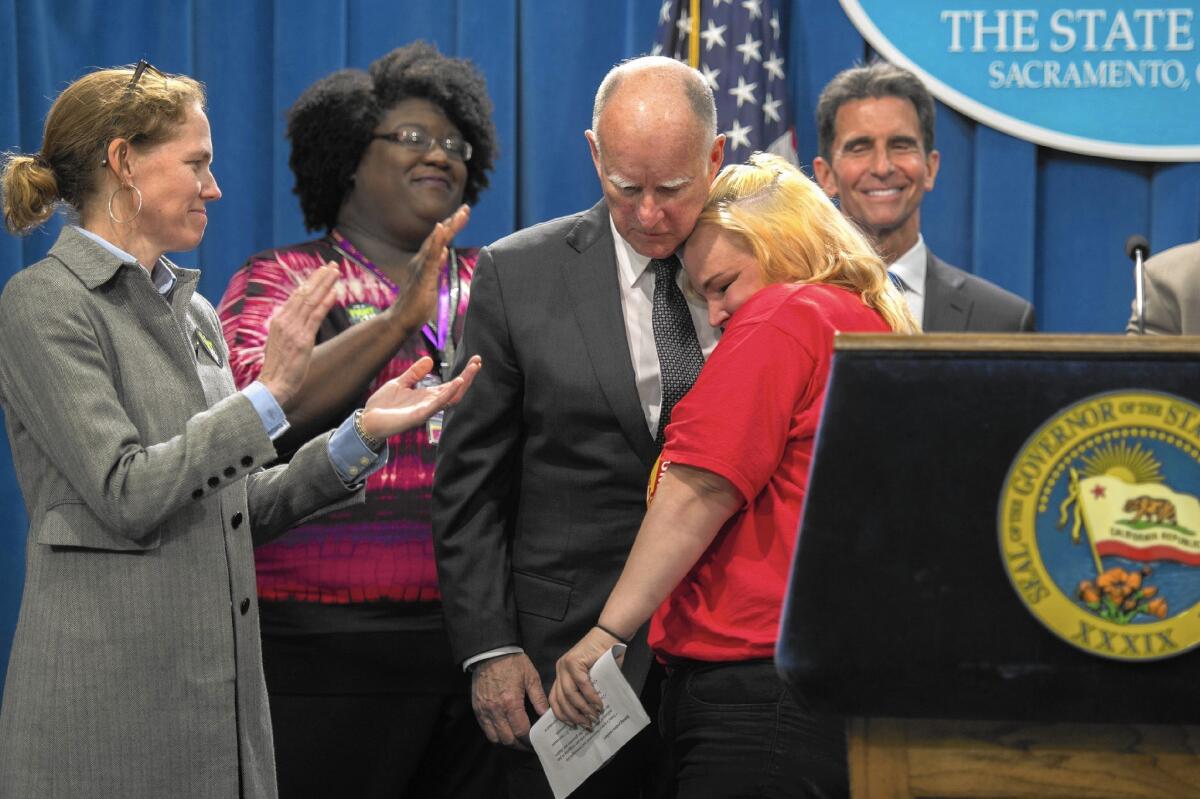Readers React: Is California’s new minimum wage a boon for workers or a financial disaster for the state?

Gov. Jerry Brown hugs Burger King worker Holly Diaz, 38, of Sacramento. She’s worked for the minimum wage for nine years.
- Share via
“Boon to low-income adults.” “ Small-business job-killer.” “Good for cities, bad for rural regions.” “Too fast or long-overdue.” “All about fairness.”
Conflicting opinions raged over the action in Sacramento this week on the ground-breaking minimum wage measure. The Times’ coverage — including: “Who wins with a $15 minimum wage?” and “What’s the rush on wage hikes?” — prompted dozens of sharp retorts from letter writers, including these:
— Sara Lessley, letters to the editor department
Linda Kranen of Carlsbad pointedly observes:
Your editorial “What’s the rush on wage hikes?” sounds like it was written by someone with a very secure salary.
A better perspective would be to advocate for similar legislative urgency to address the lack of low-cost housing; create apprenticeship programs for better-paying jobs; and link educational grants, scholarships and loan-forgiveness to the highly specialized job requirements of California’s employers.
Don Tonty of Los Angeles pinpoints a missing element:
What The Times overlooks is who loses.
Big business will be barely affected while small businesses will be less competitive, shed employees or simply quit. Prices for those goods and services that are barely affordable to the working class will be increased so we are robbing Peter to pay Paul.
And the enormous disparity between the richest Americans and the rest of us will not change. The minimum wage emphasis appears to be smoke and mirrors to make the power brokers look generous while the average citizen bears the burden.
Let the marketplace determine the value of an employee. And if government determines someone should have a higher standard of living, let government pay for it.
Betty Vanole in Burbank offers another solution:
Raising the minimum wage sounds great and makes politicians look as if they are looking out for the little guy or gal.
However, raising the minimum wage is just a vicious cycle. The price for everything goes up along with wages.
Education is the answer to a living wage.
From Fullerton, Dennis James foresees serious consequences:
The wage hike is a huge mistake. Millions of small businesses will be affected. Many will leave California if possible to relocate their business; many will be forced to close.
I have a flower shop with 20 employees. If the bottom wage earners get a $5 raise, my experienced people want that also. If you think I can afford to give away $200,000 per year, you are wrong. I only have a few options: lay off 20% of my staff; lay off the top earners and only hire high school, part-time kids to do the work; or raise prices where the Internet companies will put us out of business.
Look at the long term, reminds Bill Bell of Mar Vista:
If that employee at Burger King pictured in your paper really believes she’ll still have a job in six years when the $15 an hour minimum wage kicks in, she’s in for a rude awakening. She and millions more like her will be standing in the unemployment line faster than you can say Jerry Brown.
Every retail establishment and fast-food restaurant in the state will slash personnel to the bone and “cybernate” their operation so employees are superfluous. Fifteen an hour will make the Great Recession seem like a tea party when it comes to job killings.
The state and the federal government should abolish all minimum wage laws and let the market decide.
What about the role of the unions, asks Domenico Maceri in San Luis Obispo:
The governor’s deal on the minimum wage to avoid a more precipitous increase planned by the unions through a referendum gives the current or future governor the power to delay the increase if the economy tanks.
Why should minimum workers be punished if the economy tanks? In a downturn, minimum wage workers would be punished because their hours at work would be reduced or possibly eliminated completely through layoffs. Maybe the unions who negotiated with Brown on the compromise made a mistake?
David Capelouto of Redlands thinks it’s overreach:
By what legal authority does the government, at any level, have the right to set wage levels for employees in private sector business? I understand that it has an obligation to establish regulations for the safety and health of employees and customers. But, other than establishing taxes, it does not provide any funds to the employer for operational expenses, including wages.
And in Studio City, Barry S. Erbsen draws on his past:
A quick observation on this subject of wage hikes. I’m a 75-year-old man who worked for hourly pay decades ago, first for a market, then as a lifeguard for the City of L.A. and then as a water ski instructor for several years.
In those jobs, I made between $1.25 and $1.50 an hour. It has occurred to me that prices in those approximately 50-plus-years have gone up by a factor of 10, or just move the decimal point one place to the right.
I think this is fairly accurate for most things, but it has not worked for hourly wages! Minimum- wage laws have NOT kept up with prices. Think about that.
Follow the Opinion section on Twitter @latimesopinion and Facebook
More to Read
A cure for the common opinion
Get thought-provoking perspectives with our weekly newsletter.
You may occasionally receive promotional content from the Los Angeles Times.










